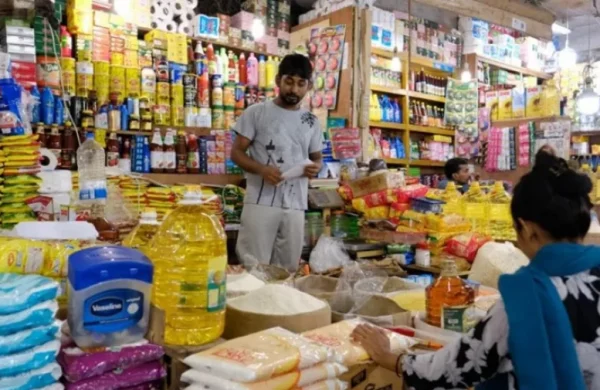When Eid smiles fade with the spending outflow
- Update Time : Tuesday, March 25, 2025

—Rafad Asgar and Samira Tasnim—
The holy month of Ramadan has begun — a time of restraint, self-purification, and worship. The fragrant air of fasting carries the peace of iftar, the silent prayers of sehri, and the heart’s anticipation of Eid’s joy. Yet, alongside this joy, there is an unspoken anxiety, a hidden fear — soaring prices.
Going to the market every day feels like a battle, where matching the budget often becomes an impossible task. For example, the price of oranges, which was Tk280 per kilogram before Ramadan, rose to Tk380 on the very first day of Ramadan. The situation in the vegetable, fish, and meat markets is no different.
This raises a question — given the population of nearly 180 million, is the rise in prices of essential goods before Ramadan and Eid an inevitable reality?
In recent years, inflation has steadily risen due to various global factors like the Covid-19 pandemic and the Russia-Ukraine war. This January it was 9.94% and it slightly decreased to 9.32% in February, but no positive impact was visible in reality. Instead, the prices of rice, lentils, and oil, among other essentials, seem to be spiraling out of control.
This market instability is not just caused by global factors but also by business syndicates and the corrupt market system. The biggest proof of this is the shortage of bottled oil in the market despite adequate supply. As a result of this crisis, a five-litre bottle of soybean oil, which was priced at Tk958, is now being sold for Tk980. This comes despite repeated assurances that the supply of essential goods was sufficient and that prices would not increase during Ramadan.
A new crisis has emerged in the form of increased VAT. In January, the government announced plans to introduce a special allowance for government employees. In anticipation of this, an additional 5% VAT was imposed on top of the existing 5%, making the total VAT 10%.
This decision accelerated the rise in prices, but even though the special allowance was later suspended, the extra VAT still remains. The reality of this can be easily felt — what was once a Tk150 VAT on a Tk3000 purchase now becomes Tk300. It’s like “a blow upon the wound.”
Some supermarkets advertise the removal of VAT, but the reality is different in most stores. In most branded shops, the extra VAT is still being charged. In some retail stores, they even claim, “No VAT,” yet prices have already been inflated. The result is that instead of relief, the burden has only increased, and the shopping budget for consumers has risen.
Eid is supposed to be a time for new clothes, delicious food, and the smiles of loved ones. But for the middle class, this dream of joy has become almost a luxury. The hope of seeing a child’s smile seems to fade in the face of the harsh reality of the market. When a parent pulls out a calculator to work out the cost of Eid clothes, the furrowed brow becomes more pronounced than the joy of the festival itself.
The price of essential items has increased by Tk10-20 per item, making the total shopping cost Tk100-200 more. The surge in demand and the trap of unethical profiteering drains all the colour from this festival, turning it dull. The rise in prices, limited incomes, and increasing cost of living — together, these have turned Eid into a test, where the scales of grief outweigh that of joy and laughter.
Meanwhile, due to recent global sanctions, foreign funding has decreased, leading to the closure of many workplaces. Some factories like Beximco have shut down, resulting in job losses for countless people.
It’s not just the poor, but even the middle class, dependent on industries, is now facing a crisis. As a result, observing Ramadan or celebrating Eid has become almost impossible for them in this high-priced market.
If this vicious cycle continues, the ongoing price hike and decreased purchasing power will become one of the main drivers of class disparity.
Eid is not just a festival — it’s a reflection of our society. But when poverty’s shadow lengthens and economic inequality intensifies, the true joy of the festival remains confined to only certain classes. For thousands of middle-class families, Eid has now become just a test — a test of their purchasing power, their ability to adapt, and their silent struggle to bring a smile to their children’s faces.
Still, people live in hope. Maybe, one day, on some Eid, this uncertainty will be gone. Maybe, one day, the festival will truly bring joy to everyone — not just the rich, but every single person.
Rafad Asgar and Samira Tasnim are Research Associates, Bangladesh Institute of Governance and Management (BIGM). Emails: [email protected]; [email protected]


















